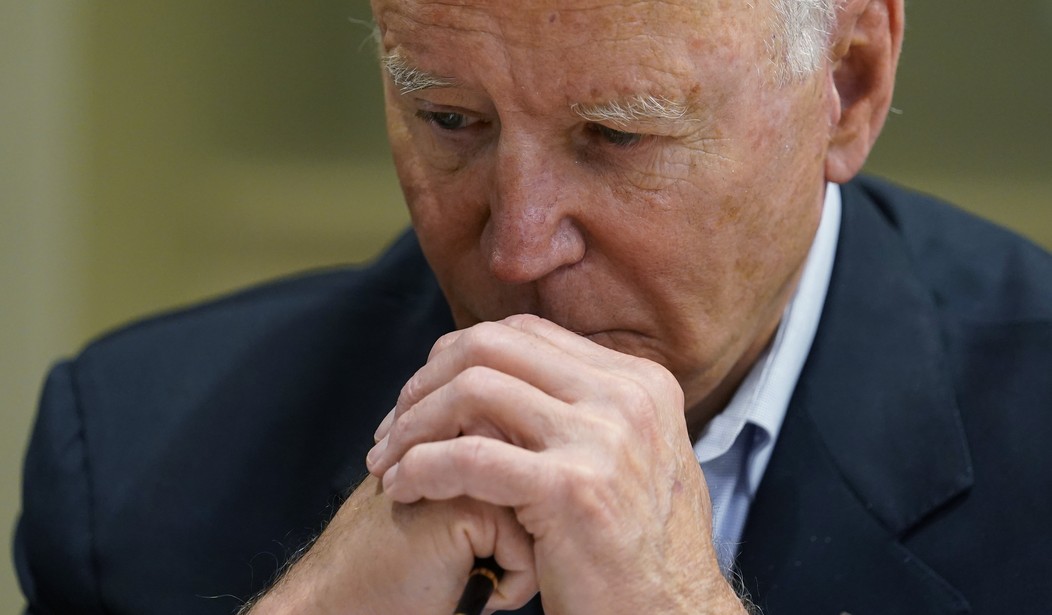At the rate we’re going, the conventional wisdom about Glenn Youngkin falling short in Virginia next month won’t be “Well, it’s a very blue state.” It’ll be “How the hell could the GOP lose there when Biden is polling as terribly as he is?”
This new survey from CNBC helped knock his average job approval today at RCP below 43 percent. He’s at 41/52 in CNBC’s poll, down seven points since July. At RCP, he’s sitting at 42.8 and counting. He was at 50 percent approval as recently as mid-August.
Worse for Dems, the issues that are eating up his support in the CNBC data are the fundamentals on which voters typically make their decisions in the booth. Pessimism about COVID and the economy, especially inflation, is rising. Since there’s no sign of a near-term turnaround for America’s problems on either front, there’s no sign of a near-term turnaround for Biden’s polling either. All Democrats can do is hope that something passes on infrastructure before November 2 and that there’s enough of a blue cushion in Virginia for McAuliffe to land softly on Election Day instead of getting mangled.
CNBC has him at 40/54 on the economy, perennially the most important issue to voters.
Inflation now ties with the coronavirus as the biggest concern for Americans, up 16 points from the prior survey. A plurality of 47% of the public believe there will be a recession in the next year, up 13 points from when the question was last asked in 2019…
Recession worries come with increasingly negative views about the current and future state of the economy: 46% say the economy will get worse in the year ahead, the most in the 13-year history of the poll and 79% judge the economy as just fair or poor, the most since 2014…
The survey clearly shows Americans noticing the supply and labor shortages that are plaguing businesses. Some 60% of the public say goods that were once easy to buy are in short supply, including food and groceries, paper products, and cleaning products.
Also, 66% appear to have noticed labor shortages, saying they have experienced stores closed on odd days or at strange hours when they normally would be open.
Biden’s ace in the hole, allegedly, is the infrastructure package Democrats are working on. But that bill draws only plurality support, 41/30, at the moment. Dems think they’re buying votes by handing out goodies in their package, but if it passes it’ll be all too easy for Americans to assume that any further rises in inflation are a direct result of the left’s spending spree. I’m not convinced that Biden’s approval for handling the economy won’t get worse after Congress passes a bill instead of better.
If you’re following the news lately on his polling decline you know that the two groups that have turned on him most sharply are independents and Hispanics. Read Geoffrey Skelley at FiveThirtyEight today to see just how much. Every president sees some slippage during his first year in office as the post-inaugural “honeymoon period” ends but Biden has crashed lately with indies and Latinos. Among independents he’s shed no less than 15 points, falling from an average of 50 percent support in spring to 35(!) now. Among Hispanics it’s worse:

He’s lost around 20 points with that group, from strong majority approval after being sworn in to less than 50 percent support now. It’s not (just) immigration either, as he’s down sharply among Latinos on both the economy and COVID. A year ago Dems might have shrugged at that and said, “What are they going to do, vote Republican?” Having seen Trump overperform with Hispanics in November, though, it’s now increasingly plausible to say: Yeah, they’re going to vote Republican. Many will, at least.
There are two pillars of the current Democratic coalition, nonwhite voters of all income classes and higher-earning well-educated whites, the sort who populate the suburbs. If Biden’s slipping with the first group, he and Terry McAuliffe will need to rely that much more heavily on the second. But Dems are worried about their hold on suburban voters in Virginia too. Glenn Youngkin has run a canny campaign to appeal to them, emphasizing parents’ grievances with school policy while McAuliffe has spent most of his time yammering about Trump. Are the suburbs going to break his fall on Election Day?
“Virginia will tell us whether past frustration with Trump still lingers in the suburbs,” said Robert Blizzard, a Republican pollster who focuses on suburban voters. “You’ve got McAuliffe talking about ‘Trump, Trump, Trump,’ and Youngkin focused on suburban issues, like education, cost of living and jobs. That’s the tug of war for the suburbs.”…
“If Democrats are bleeding in the suburbs now, no way you’re not bleeding the suburbs next year,” said Dan Sena, former executive director of the Democratic Congressional Campaign Committee…
“No question Republicans are going to claw back some suburban voters post-Trump,” said Tom Davis, a former Republican congressman who represented northern Virginia and led the National Republican Congressional Committee, “but suburban voters were already moving away from us before Trump.”
Dems aren’t just shouting “Trump!” every five seconds to keep suburbanites in the fold. They’re also running on school COVID mandates, paid family leave, and abortion rights, believing that’s the magic formula to pile up votes with professional women especially. I take it as a bad sign for them, though, that they’ve begun spinning McAuliffe’s own bad polling as a *good* thing because it might spook complacent Virginia Democrats into turning out on Election Day. If your most optimistic take on the race at the moment is that there’s a real and growing chance you might lose, you’re desperate.








Join the conversation as a VIP Member